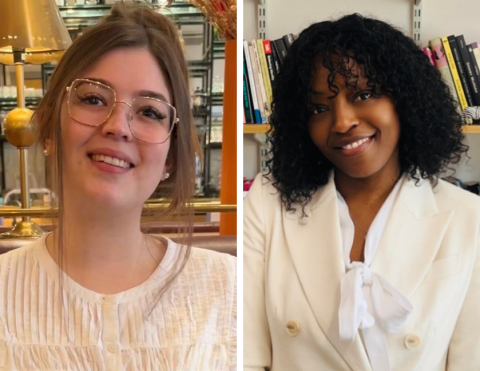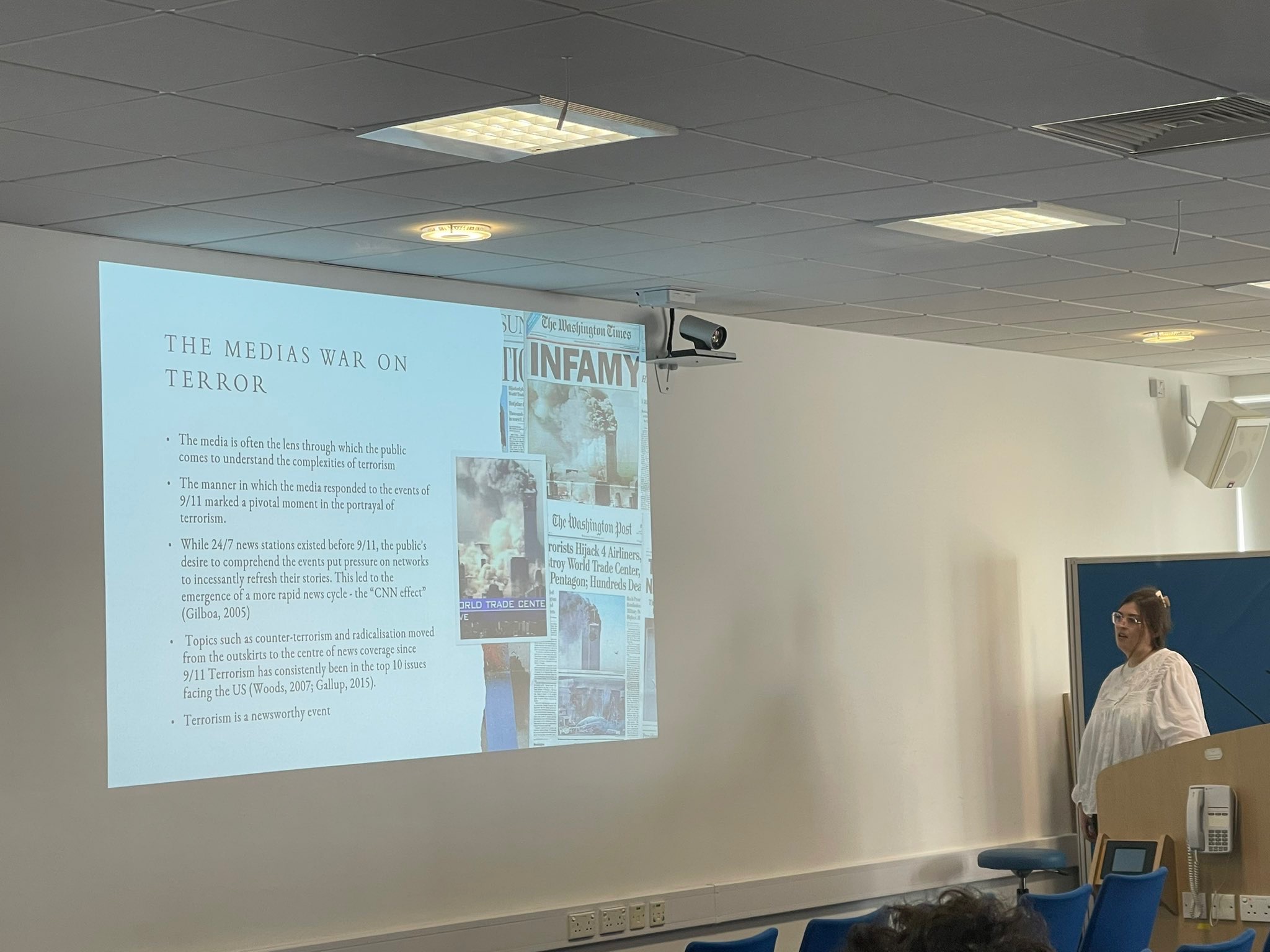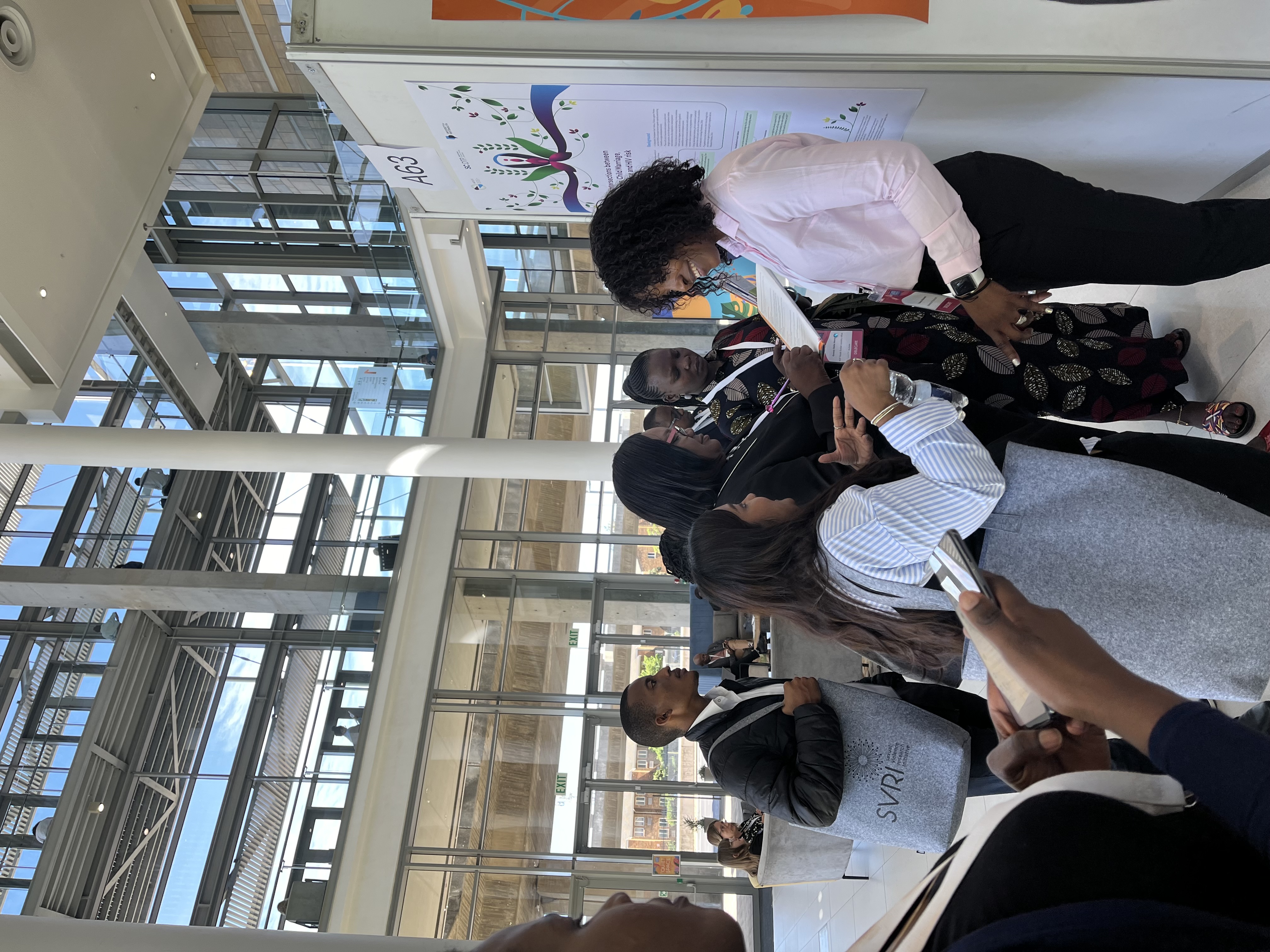

Two University of Portsmouth PhD graduates have been awarded research fellowships from the SCDTP.
5 minutes
Olivia Caskey from the School of Criminology and Criminal Justice and Patience Mutumani from the School of Area Studies, Sociology, History, Politics and Literature have been awarded prestigious research fellowships from the SCDTP.
These fellowships offer a great opportunity for early-career researchers to build their independent research careers and develop their skills in a supportive environment.
Meet our two award recipients
Who are you?
I am Olivia Caskey, an ESRC Postdoctoral Fellow in the School of Criminology and Criminal Justice.
What is your background?
I began my academic journey with a BSc in Sociology and Criminology from 2014 to 2017, here at Portsmouth. It was during this time that my interest in my current research topic first emerged, and I completed my undergraduate dissertation on the same topic as I research today. After completing my undergraduate studies, I pursued an MSc in Cybercrime within the criminology department, where I further refined my research interests and began designing my PhD project. A year later, I was awarded an ESRC SCDTP 1+3 PhD studentship, which placed me in the School of Area Studies, History, Sociology, Literature, and Politics.
During this time, I completed an MSc in Social Research Methods at the University of Southampton, which allowed me to develop the methodological approach used in my PhD research. After completing this program, I began my PhD and successfully defended my thesis in April of this year.

What is your research about, and why is it important?
My research focuses on the media’s representation of gender in relation to terrorism and explores how gender and gender power structures influence public perception and policy formulation in response to terrorism. This topic is significant because the media’s representation of terrorism often reinforces certain stereotypes and biases around gender, which impact both public opinion and the decisions made by policy makers. By analysing and bringing attention to these misrepresentations, my work seeks to understand the ways gendered narratives contribute to societal fears, shape responses to perceived threats, and influence policies that may ultimately affect security practices.
What is the SCDTP scholarship for / what will you be doing?
The postdoctoral fellowship is a one-year position funded by the Economic and Social Research Council. It provides the time and resources needed to consolidate my PhD research, develop publications, and build networks to strengthen my academic career.
What did you have to do to get the fellowship?
The first requirement was to have less than 12 months of postdoctoral experience since my viva. Next, I had to identify a mentor who was not my primary PhD supervisor. I then needed to design a full program of development activities to undertake throughout the fellowship year, budget them out, and write a lengthy application with the support of my mentor.
What do you hope to achieve in the year?
I aim to achieve two solo-authored publications based on my PhD work and am actively working to secure a book contract to publish my thesis as a monograph. I also plan to present my findings at conferences and expand my professional network.
Where do you hope to be in 5 years?
In a position where I feel my research has made a difference, small or big.
Would you recommend the fellowship route to others?
Yes, I would highly recommend it. The fellowship provides an excellent opportunity to consolidate the work done during the PhD and offers valuable time to fully appreciate and reflect on your research. The PhD process can feel very intense, so having this dedicated period allows for deeper engagement with the work. Additionally, the funding is prestigious so it can add significant value to one’s academic profile.
Do you have any advice for budding researchers?
Stay true to your research ethos, take ownership of your work, believe in its value, and avoid comparing yourself to others. For some practical advice: invest in a good office chair. You’ll spend a lot of time sitting and writing, so protect your back!
If you could pick up any new hobby or skill, what would you choose?
I wish I could speak another language. I'm not sure which one, but it’s something I regret not pursuing when I was younger.
What’s the last book, TV show, film, theatre show or podcast you enjoyed?
The Eras Tour Movie, Taylor Swift!
Who are you?
My name is Patience Mutunami. I am a postdoctoral fellow based in the Centre for the Advancement of Equality, Gender and Inclusion Studies at the University of Portsmouth.
What is your background?
I am a development expert with over 5 years of development practice in the global context having worked with diaspora communities affected by gender-based and sexual violence across the greater Portsmouth area.
I have held a Research Fellow post in the School of Area Studies, Sociology, History, Politics and Literature working with Professor Tamsin Bradley on the FCDO funded programme ‘The Girl Generation- Africa Led Movement to end FGM’. I have also supported colleagues in the department with teaching on the Global Development Module at level 4. I coordinate the Centre for the Advancement of Equality, Gender and Inclusion Studies which jointly sits between the Faculty of Humanities and Social Sciences and the Faculty of Business and Law.
I hold a BA (Hons) International Development Studies and a MRes Development Studies from the University of Portsmouth. I also hold a MSc Social Research Methods Area Studies from the University of Southampton. I completed my PhD in International Development in 2023 at the University of Portsmouth.

What is your research about and why is it important?
I am a feminist researcher activist with interests ranging from issues of violence against women and girls (VAWG), culture and women’s health and wellbeing, concepts of female empowerment, and development policy and programming. I am interested in intersectionality and the role that conservative gender ideology plays in legitimising VAWG and perpetuating gender inequality. I am also interested in how vulnerabilities and subjectivities are formed and how agency and autonomy is negotiated.
As Sustainable Development Goal 5 reflects, VAWG is the biggest barrier to gender equality and tackling it should be an urgent development priority. There is still a lack of awareness and acceptance at policy level through to practice, into the wide spectrum of gendered violence which includes forms often categorised as ‘cultural practices.’ How different forms of VAWG are shaped by harmful gendered norms and legitimised through processes of socialisation is also often missed in practice. This lack of a deep and contextual understanding of what constitutes VAWG and why it happens, means the full extent of gendered vulnerabilities are not always addressed.
My thesis argued that understanding the social and cultural norms which underpin and normalise violence is paramount to any programme of change. Transforming behaviour and mindsets shaped by harmful attitudes is key in moving towards a world free of VAWG. My thesis had a country focus of Zimbabwe. I explored links between FGM type 4 (in Zimbabwe Labia Elongation is commonly practised), child marriage, bride price, and the risk of HIV infection. I demonstrated how they are linked by the same harmful gender norms legitimised through socialisation processes.
My research generated new empirical data that demonstrated how the same harmful norms legitimise all forms of harm including HIV transmission though sexual violence and can be better addressed by integrating norm change action within HIV programming that is a priority focus in Zimbabwe. My research showed that at present each identified form of harm to women and girls is siloed, implemented separately because the link between them has not been recognised. Approaches to similarly integrate end VAWG in development need to be carefully thought through to avoid the limitations of gender mainstreaming. My thesis was able to present an approach to fully integrate social norm change activities across programming and in fact link them.
What is the SCDTP scholarship for / what will you be doing?
Transforming behaviour and mindsets shaped by harmful attitudes is key in moving towards a world free of VAWG. With the fellowship I can explore the integration of end FGM activities in development practice. The fellowship is not only enabling me to continue to contribute theoretically to the integration discourse but also supports me to move it forward in practical terms. My research also found that the risk of HIV infection is normalised by women. The women I spoke with shared that the risk is necessary in order to stay married. This elucidates the importance placed on social status over health and wellbeing. What this means is that interventions will always be responsive rather than preventative because women do not have the cultural and social leverage to prevent themselves from getting infected with HIV.
We therefore need approaches that will challenge the legitimation of risky sexual behaviours. My first objective is to translate my research around different forms of FGM and the related harm into more comprehensive risk assessment frameworks. With the fellowship I am building up on my applied work and using my research and the evidence it generated to develop and deliver bespoke training focused on challenging practices of cultural gendered harm at different levels for stakeholders including solicitors, social workers, schools, civil society and families from affected communities. This work will feed into policy and practice at community and programming level to ensure girls and women are safeguarded from restrictive gender and cultural norms that reinforce male dominance and increase vulnerability to multiple forms of violence. The training includes a module that interrogates harmful norms and challenges their normalisation.
As part of my fellowship, I recently attended the Sexual Violence and Research Initiative conference in Cape Town where I presented my research findings. This is a key research conference on violence against women, violence against children, and other forms of violence driven by gender inequality in low and middle-income countries. The conference attracted researchers, practitioners, policymakers, donors, survivors and others to share and learn about new research, developments and innovations. It is the largest abstract driven conference dedicated to research on prevention of and response to violence against women in all their diversity and violence against children. I will also be attending research focused events and engaging with a range of different audiences to communicate my research findings and develop an academic network through collaborative initiatives with colleagues including non- academic professionals.
In addition, I will host a research symposium focused on ‘Challenging harmful norms to end violence against women and girls’ where I will present my research findings. The event will draw in global researchers from the field of gender-based violence and intersectionality. Since my long-term goal is to attain a lectureship, I will undertake further training and teaching in order to attain Fellowship of Higher Education Academy status. I am also in the process of revising my thesis for publication as a monograph and will produce a separate journal publication in order to help establish track record. Lastly, through the fellowship, I will continue to participate in AEGIS’s funding bid writing programme and support network to develop skills in applying for funding opportunities.
What did you have to do to get the fellowship?
As a former recipient of the South Coast Doctoral Training Partnership (SCDTP) scholarship, I became aware of the fellowship programme shortly before completing my PhD. Due to the Covid pandemic, there were a few elements of my PhD that I could not complete during the funding cycle, that could only be accomplished through additional funding. I responded to the SCDTP callout for postdoctoral fellowship applications. The process was competitive and included attending a rigorous interview where I demonstrated the impact of my research and how the fellowship would help me maximise on it.
What do you hope to achieve in the year?
Meet all the objectives of my postdoctoral fellowship.
Where do you hope to be in 5 years?
Acquire a lectureship.
Would you recommend the fellowship route to others?
For those researchers who have aspects of their research they would want to consolidate after a PhD, I would recommend getting a postdoctoral fellowship. This would also provide the space and scope to map out one’s preferred career pathway.
Do you have any advice for budding researchers?
Think Decolonial - There is always a different perspective. Liberal thinking paves the way for innovative approaches to inquiry to emerge. Until there is nothing to discover, keep searching. One’s curiosity threshold determines one’s ability to learn and solve problems.
Think Solution - Where theory exists, practice should ensue. Because of the ever-evolving existential landscape we need more pragmatic solutions and the need to focus on applied research couldn’t be more requisite. Unless we provide practical solutions to that which we theorise, we have an incomplete case study. For every research project, think solution.
If you could pick up any new hobby or skill, what would you choose?
Playing the guitar- This skill would enable me to engage with my inner rhythm.
What’s the last book, TV show, film, theatre show or podcast you enjoyed?
Book: Noam Chomsky’s ‘How the world works’ – a revelatory piece of work that awakens the sub- conscious to an uninhibited critical analysis of the realm of geopolitics.
TV Show: Yellowstone.
Film: Oppenheimer.
Podcast: The Wild with Chris Morgan- nature never stops to intrigue.
Find out more about the fellowship scheme and learn about the other 2024/25 cohort of Postdoctoral Fellows.
The 2025/2026 ESRC-SCDTP Postdoctoral Fellowship Call is now open for applications.
Enable University alerts
Turn on notifications for critical updates like closures, safety alerts, and urgent service disruptions.





